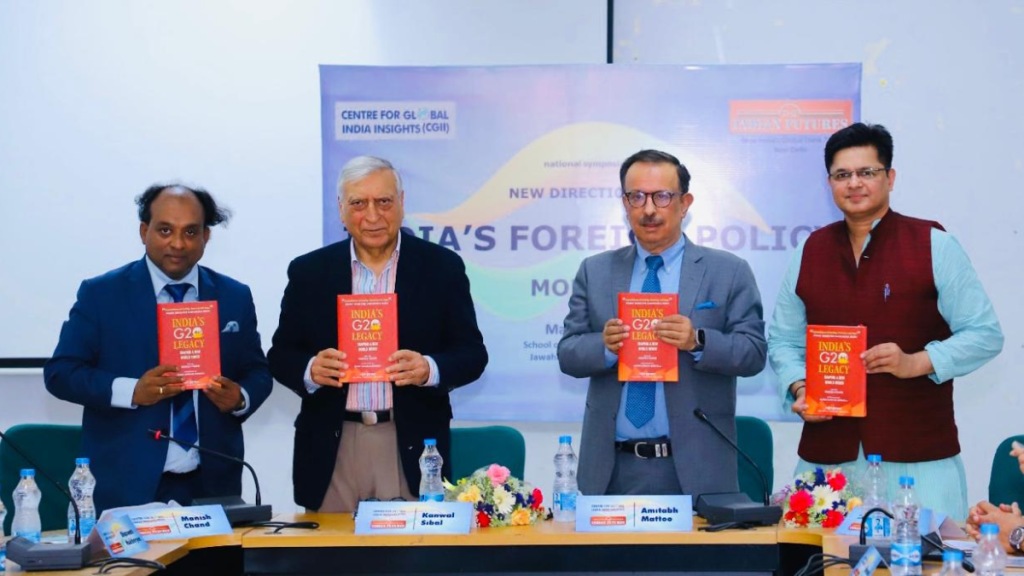If Narendra Modi becomes the prime minister for the third term in June 2024, India will continue to expand ties with major powers, including the US and Russia, and will aim to become “Vishwa Bandhu” – a friend to the world, said eminent diplomats and experts.
The National Symposium on “New Directions in India’s Foreign Policy – Modi 3.0” focused on mapping the contours of India’s foreign policy under a potential Modi 3.0 government/the next government in India.
Prominent experts, who participated in the conference predicted a rise in India’s international order, the growth in GDP to $7 trillion and greater recognition of the country’s soft power as key goals of the potential Modi 3.0 government.
“Russia will continue to be an important partner for India. There will be a summit meeting between Prime Minister Modi and President Putin in 2024,” Kanwal Sibal, India’s former ambassador to Russia and a former foreign secretary, told the conference. The last annual summit between the leaders of India and Russia was held in New Delhi in December 2021.
“Russia has begun to value partnership with India in a much bigger way than it used to be the case before. Earlier, there was a sense that it is India which needs Russia more,” said Sibal, also a former foreign secretary. “There is a genuine desire on the part of both India and Russia to increase trade and investment ties,” underscored Sibal, Chancellor, Jawaharlal Nehru University (JNU).
Going forward, Sibal said while India’s relations with Russia will grow in the next five years, India might begin to push back the US’ tendency to lecture, as was seen in critical remarks by US officials on the state of religious freedom in India.
Arun K. Singh, a former ambassador of India to the US, said that “the positive momentum” in India-US relations will continue under the next government in India regardless of whether Joe Biden or Trump wins the USA elections. He cited the China factor as one of the main reasons for the convergence between the interests of India and the United States.
“Relations with three major poles of the world – US, Russia and Europe – will continue to expand on separate trajectories,” said Manish Chand, CEO, Centre for Global India Insights, the organizer of the conference. “Looking ahead, India’s foreign policy, under Modi 3.0, will be driven and animated by the overarching goal of making India a great power that can hold its own amid competitive geopolitical rivalries,” said Chand.
Underlining the strategic importance of Russia for India, Amitabh Mattoo, Dean, School of International Studies, JNU, said: “Russia is the only P5 country to recognize India’s complete sovereignty over Kashmir.” India retains a degree of strategic autonomy, which was seen in how India managed its relations with Russia in the last few years, said Prof Mattoo.
Mattoo stressed on the emphasis in the BJP’s manifesto on making India a global power and “Vishwa Bandhu.”The main message of the BJP manifesto is making India “Vishwa Bandhu,” he said.
Economic Diplomacy
Looking ahead, Mohan Kumar, India’s former ambassador to France, predicted that India-EU relations will continue to grow stronger in days to come. India-EU free trade negotiations will acquire momentum in days to come, he said. The EU is important for India for the emerging technologies and green technology is more likely to come to India from the EU, he said.
Highlighting the importance of trade policy and trade diplomacy, Anil Wadhwa, a former Indian ambassador to Italy, said that one can expect finalization of FTAs with the UK and Oman in the next few years. These trade deals will be important for India to scale up GDP to US$7 trillion by 2031, he said.
The conditions for the rise of India have never been so propitious – the world’s fastest-growing economy is set to reach at least US$5-8 trillion GDP by 2030, which will give it more leverage in influencing negotiations and outcomes in the international arena, said Chand, author and editor, “India’s G20 Legacy: Shaping a New World Order.”
Ukraine Peace
Diplomats and experts also advised that India should not waste its “political capital” on Ukrainian President Volodymyr Zelensky’s 10-point peace plan, which they called “flawed” for not including Russia. “Indians shouldn’t mediate in the Russia-Ukraine conflict till both the parties are present. India shouldn’t waste its political capital on this peace proposal,” remarked Ambassador Bhaswati Mukherjee, the President of India Habitat Centre and a former envoy to the Netherlands. She stressed that it was imperative for both Russia and Ukraine to “talk to each other” and be in the room during the peace conference hosted by Switzerland in June. “It can’t happen without Russia,” Sibal told the conference.
Speaking at the conference, Air Vice Marshal (retd) Anil Golani projected that India’s hard power and deterrence will grow stronger in the next few years. In this context, he underlined the need for India to become a powerhouse of high-tech defence manufacturing and R&D Hub for defence industry. Diplomacy cannot succeed in the absence of the hard power, he said.

